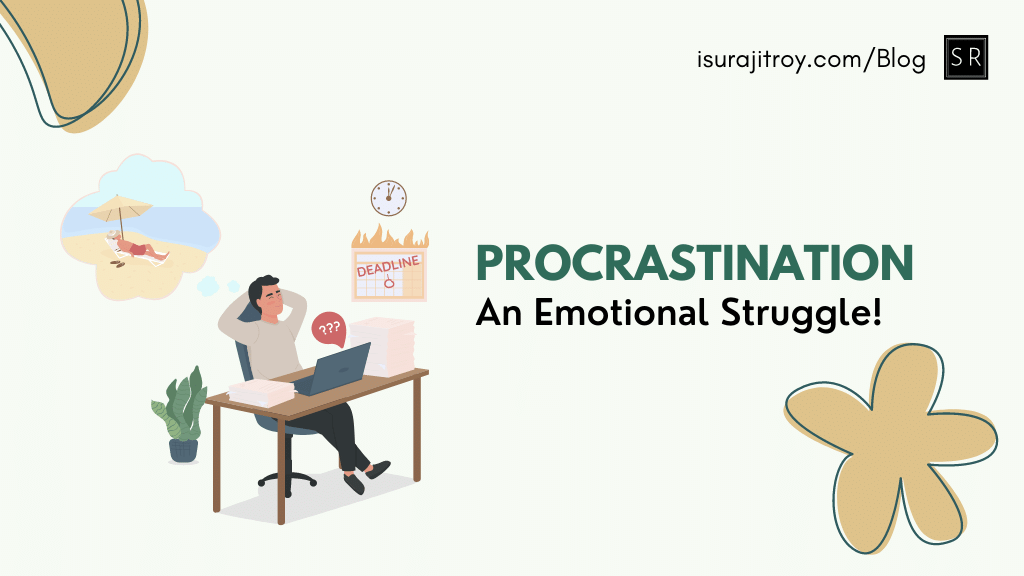
Are you tired of constantly pushing off tasks and finding yourself in a last-minute scramble to get everything done? Do you struggle with feelings of guilt and inadequacy as a result of procrastination? You’re not alone! Procrastination is a common issue that plagues people from all walks of life. But it doesn’t have to be a permanent fixture in your life. In this blog, we’ll explore the causes of procrastination and provide practical strategies for overcoming it so you can start living a more productive and fulfilling life.
“Procrastination is inevitable, but don’t wait too long to do what can be done the day after!”
What is procrastination?
Procrastination is a behavior characterized by the deferment of tasks or activities that should be completed in the present. This behavior is often associated with anxiety, lack of motivation, or an inability to manage time effectively. It is a common problem among adolescents and adults. While some procrastination is generally accepted, chronic procrastination can lead to decreased productivity and increased levels of stress. Procrastination can be managed and reduced through the use of strategies such as planning, goal setting, and time management. These strategies can help to reduce stress and increase productivity by providing more structure and focus to daily tasks.
Do you manage your time well?
Procrastination is a problem that can have serious consequences for effective time management. It is defined as the tendency to avoid tasks by delaying them or replacing them with activities that are less important. It is a major obstacle for many people when it comes to managing their time and achieving their goals. Procrastination can lead to an increased sense of stress, guilt and reduced self-esteem. It can also lead to an increase in the amount of time required to complete tasks and can cause people to miss deadlines. For this reason, it is important to identify and address procrastination in order to improve time management.
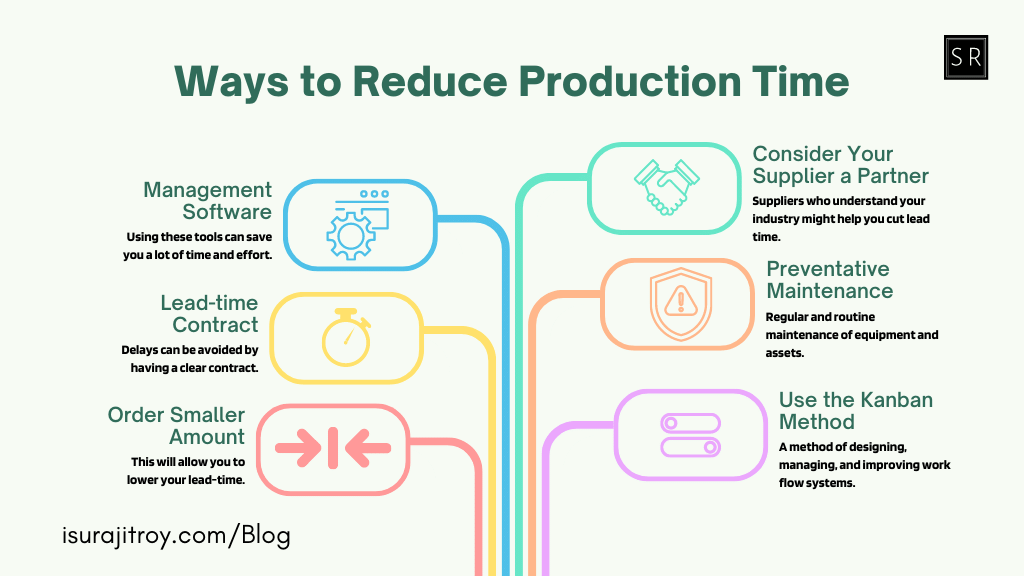
How to manage it?
Strategies to help combat procrastination include breaking down tasks into smaller, more manageable parts, setting achievable goals and creating a schedule that allows for flexibility. Finally, it is important to be mindful of one’s own thoughts and feelings and to be aware of the impact that procrastination can have on one’s life. By taking steps to address procrastination, people can increase their chances of success when it comes to managing their time.
Is procrastination linked to mental health problems?
It is widely known that procrastination can have a negative effect on our lives, but few people know that it is also linked to mental health issues. Procrastination can lead to feelings of guilt, low self-esteem, and anxiety. It can also cause physical stress and exhaustion, as well as increase our risk of depression. In this paragraph, we will discuss how procrastination impacts our mental health and how to combat it. We will explore why it is so difficult to break the habit and how to create a plan to help us stay on track and achieve our goals. Finally, we will discuss the importance of self-care and how to build healthy coping strategies.
Connection to mental health conditions.
Procrastination can have a serious impact on mental health. It can lead to feelings of guilt, anxiety, and depression. People who procrastinate may worry about not being able to finish tasks and feel overwhelmed by the amount of work they need to do. They may be unable to focus and have difficulty forming healthy habits. Procrastination can also lead to decreased self-esteem and self-confidence, which can have a serious impact on mental health. Learning how to manage procrastination and develop better habits can help improve mental health and overall wellbeing.
Procrastination plays an important role in depression.
Procrastination plays an important role in depression. When people procrastinate, they put off tasks or activities that are important to them, and this can lead to feelings of guilt or shame because they are not meeting their expectations or goals. This can lead to a cycle of avoidance, where people continually put off doing things that would help them feel better. This can lead to a lack of satisfaction with life and a feeling of hopelessness, both of which are common symptoms of depression. Additionally, procrastination can lead to a lack of motivation and energy, which can then lead to a lack of interest in activities and social interactions. All of these can contribute to feelings of depression. Ultimately, procrastination can be a risk factor for developing depression, so it is important to keep it in check.
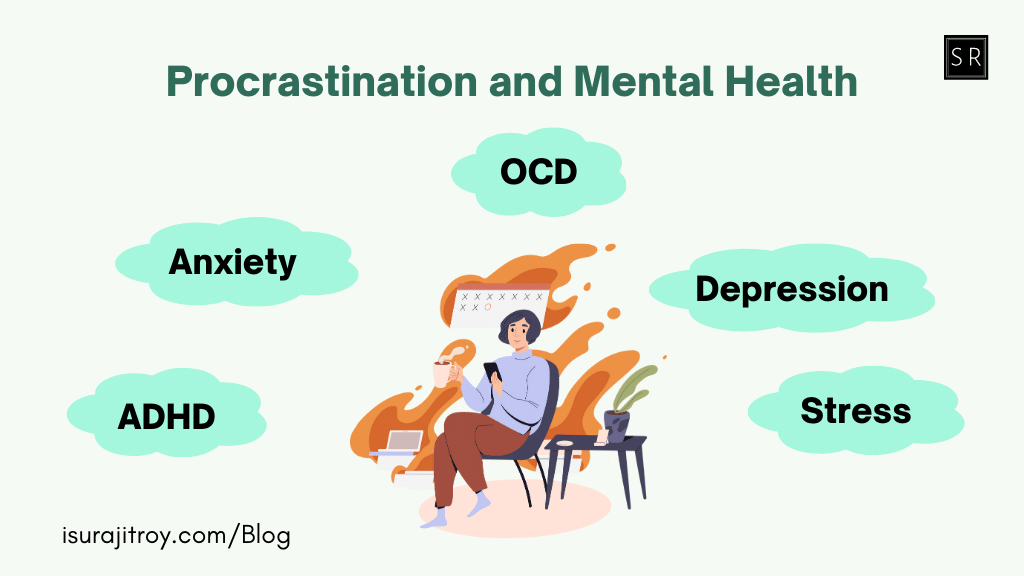
When procrastination points to anxiety?
When procrastination points to anxiety, it means that the individual is avoiding or putting off tasks or responsibilities due to feelings of stress or fear. These feelings are often caused by feelings of inadequacy or feeling overwhelmed. Procrastination in this case is often a sign of underlying anxiety that the individual may not be aware of. People who procrastinate due to anxiety may have difficulty making decisions, may be easily distracted, and may avoid completing tasks because they are afraid of failure or not being able to complete them adequately. They may also experience physical symptoms like headaches, fatigue, or stomachaches. As such, procrastination can be a sign of a more serious underlying psychological issue, such as depression or an anxiety disorder, and it is important to seek professional help in order to properly cope with the anxiety and get back on track.
How does procrastination cause stress?
Procrastination can cause stress due to the feeling that one is falling behind in their goals and responsibilities. When procrastination becomes a habit, it can lead to guilt and anxiety, as well as a lack of motivation and feeling overwhelmed. This can cause one to become overwhelmed and have difficulty completing tasks. Additionally, procrastination can increase the pressure to complete tasks in a limited amount of time which can cause stress. Finally, procrastination can lead to a negative self-image, as one may feel that they are not capable of completing tasks in a timely manner. All of these things can cause one to experience stress and can lead to further procrastination.
Procrastination and ADHD.
Procrastination and ADHD are closely related. People with Attention Deficit Hyperactivity Disorder (ADHD) often struggle with procrastination. This is due to having difficulty with executive functioning, which refers to the ability to plan, focus, and manage time. People with ADHD may be distracted from tasks or have difficulty setting goals due to their difficulty with executive functioning.
Moreover, they may have trouble with the amount of work they have to do or difficulty starting tasks. Procrastination may be a symptom of ADHD, but it can also lead to other symptoms such as low self-esteem, increased stress, and poor academic performance. To manage procrastination, it is important to set realistic goals, break tasks down into smaller parts, and use external tools such as calendars or reminders. Additionally, seeking professional help may be beneficial for those struggling with ADHD and procrastination.
How does procrastination affect us?
Procrastination is a habit that can have serious consequences. It can lead to feelings of guilt, shame, and low self-esteem. It can also affect our health, leading to stress, depression, and anxiety. Ultimately, procrastination can sabotage our success and keep us from achieving our goals. It can lead to missed deadlines, missed opportunities, and a lack of progress. In the worst case, it can lead to career setbacks or even job loss. Therefore, it is important to be aware of our tendencies to procrastinate and work to overcome them.
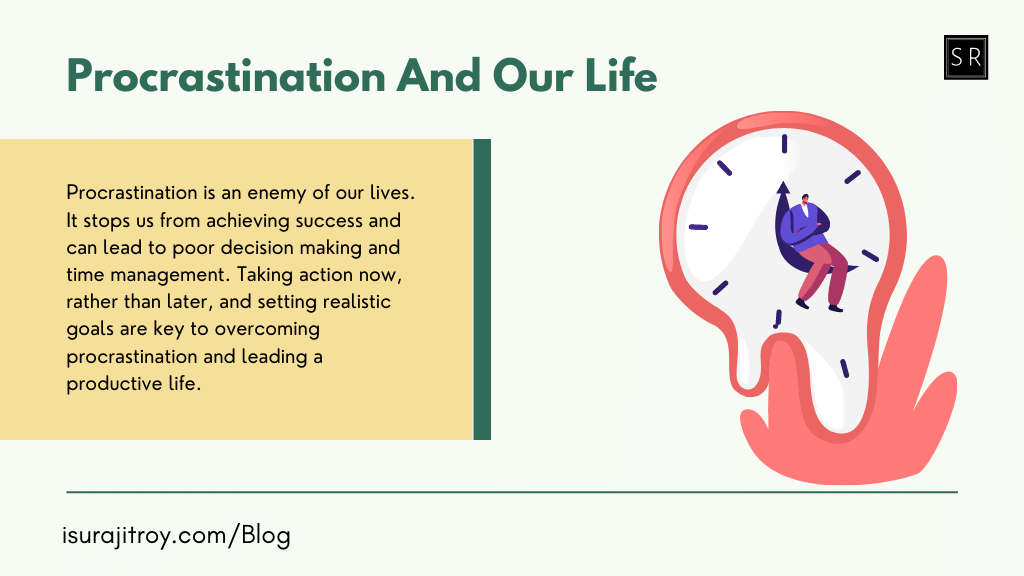
How does procrastination affect students?
Procrastination can have a negative impact on students’ academic performance and overall mental health. It can lead to increased stress and anxiety, missed deadlines, and poorly-executed projects. Procrastination can also cause a decrease in motivation, as the student is continuously pushing off completing tasks, which can lead to lower grades. In addition, procrastination can lead to missed opportunities, as the student is unable to take advantage of them due to not having enough time. Ultimately, procrastination can have a detrimental effect on a student’s academic success and overall mental wellbeing.
How does procrastination affect productivity?
Procrastination has a detrimental effect on productivity as it leads to a lack of focus on important tasks and leads to missed deadlines. It can also cause stress and anxiety as the tasks become more difficult and time-consuming. Procrastination can lead to feeling overwhelmed and lead to a lack of motivation to complete tasks altogether. By avoiding important tasks, it can lead to a decrease in productivity and make it harder to accomplish goals. It can also lead to a lack of self-confidence and impact one’s ability to plan ahead.
What is the most common cause of procrastination?
Procrastination is a common problem that can affect everyone to some degree. It can cause us to put off important tasks and miss deadlines, leaving us feeling overwhelmed and stressed. The most common cause of procrastination is fear. Fear of failure, fear of the unknown, fear of criticism, or fear of success can all lead to procrastination. This type of fear can be so powerful that it prevents us from taking meaningful action and achieving our goals. Fortunately, it is possible to overcome procrastination and take control of our lives.
1. Fear of Failure:
One of the most common causes of procrastination is the fear of failure. People often procrastinate because they are afraid of not being able to complete a task or of not doing it well enough. This fear can be overwhelming and can prevent people from even starting the task.
2. Perfectionism:
Perfectionism can also be a cause of procrastination. People may procrastinate because they want to make sure that the task is perfect and worry that it will not be good enough. This can lead to paralysis, where people are unable to even begin the task.
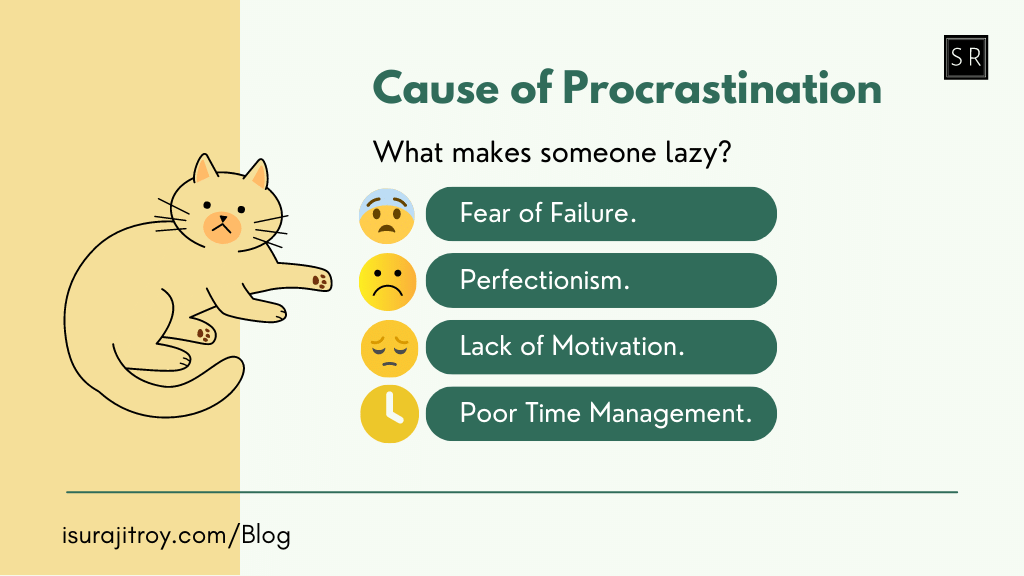
3. Lack of Motivation:
Another common cause of procrastination is a lack of motivation. People may not be motivated to do a task because they don’t find it interesting or enjoyable, or because they don’t think that it will lead to any positive outcome.
4. Poor Time Management:
Poor time management can also be a cause of procrastination. People may put off tasks because they don’t have a plan of how to complete them or because they don’t have enough time to complete them.
5. Low Self-Esteem:
Low self-esteem can also be a cause of procrastination. People may put off tasks because they don’t think that they are good enough or capable of completing them. This can be a particularly difficult issue to overcome.
How to navigate procrastination?
Do you find yourself putting off tasks until the last minute? Do you often find yourself struggling to stay focused and get things done? If so, you’re likely struggling with procrastination. While it can be difficult to tackle, understanding the causes of procrastination and developing strategies to cope with it can help you get back on track. In this paragraph, we’ll explore how to navigate procrastination, so you can stay productive and reach your goals.
Who procrastinates the most?
Generally speaking, procrastination is an issue that affects people of all ages. However, research has indicated that younger people tend to procrastinate more than adults. This is especially true for college students, who often put off assignments and studying until the last minute. Additionally, procrastination is more prevalent amongst individuals who are perfectionists and those who lack strong time management skills. It is important to note, however, that procrastination can have serious negative consequences if left unchecked. Therefore, it is important for those who procrastinate to develop strategies to help them stay on track.
Procrastination as a contributing factor.
Procrastination is a major contributing factor to many problems that people face in life. It can prevent us from reaching our goals and can lead to feelings of guilt and frustration. Procrastination does not only affect our day to day lives, but it can also have a negative impact on our long-term goals. It can lead to missed deadlines, decreased productivity and cause us to miss out on important opportunities. It is important to recognize procrastination as a potential problem and to take steps to overcome it. By creating a plan and setting achievable goals, we can work towards overcoming procrastination and achieving our desired outcomes.
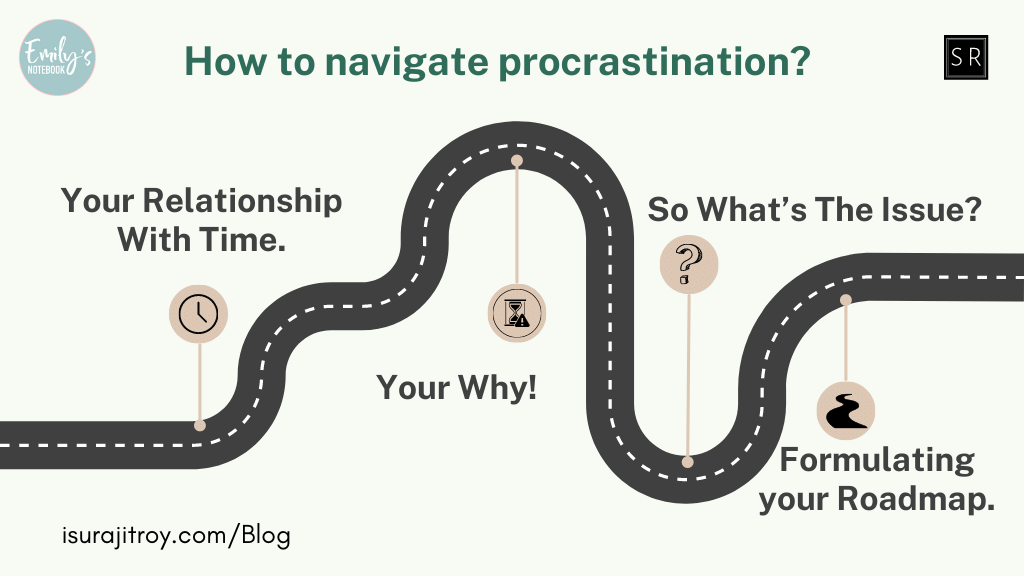
Procrastination and emotional regulation.
Procrastination can be a major obstacle when it comes to emotional regulation. When we procrastinate, we put off dealing with our emotions which can lead to a buildup of negative emotions. In addition, procrastination can lead to a cycle of stress, guilt, and anxiety which can further impact our emotional regulation. To prevent this cycle, it is important to develop strategies to deal with procrastination and take proactive steps towards emotional regulation. This can involve setting realistic goals, breaking tasks down into smaller steps, and using positive self-talk to motivate yourself.
Example with Short Story
Procrastination is a common issue in our daily lives. We often find ourselves putting off tasks that we don’t want to do or don’t have the motivation to do. It could be as simple as leaving the laundry to the last minute or as complex as delaying a project at work. We might find ourselves procrastinating for a variety of reasons, such as feeling overwhelmed, lacking confidence, or simply wanting to do something else.
Challenge false beliefs.
Challenging false beliefs is an important step in personal growth. By questioning ideas that no longer serve our highest good, we can move forward and create a life that’s richer and more meaningful. With a little self-reflection and courage, we can uncover and discard limiting thoughts, paving the way for a life filled with possibilities.
The Alarm that Changed Jane’s Life
The alarm went off at 6:00 am, like it did every morning. But this morning, something was different. Jane got up, determined to make a change. She had been procrastinating for too long and it was time to face her fears and challenge her false beliefs about herself.
She got dressed and made her way to the gym. As she walked in, she could feel the anxiety building. But she kept telling herself, “I can do this. I’m strong and capable.” Once inside, she started her workout. She focused on her breathing, pushing herself to keep going. She was amazed at how quickly the time went. When she finished, she felt a sense of accomplishment. She had done something she never thought she could do.
The next day, she did the same thing. And then the next, and the next. Soon, her days of procrastination were behind her. Jane had taken the first step towards a better future. She had challenged her false beliefs and changed her life for the better. She was now on a path to success.
Take things slow.
Procrastination is a habit to delay things, but taking things slow could be a good habit to achieve the goal. It is important to take small and steady steps in order to reach the desired outcome. Taking things slow can help to avoid stress and reduce the chances of procrastination.
The Slow and Steady Rise of Paul
The tale of Paul is a story about procrastination and taking things slow. Paul was a young man who wanted nothing more than to be successful. He worked hard and was determined to achieve his goals. Unfortunately, Paul was easily distracted. Whenever he had an idea, he would get so excited that he would immediately jump into the project without taking the time to properly plan out the project and think it through.
This led to a great deal of frustration and stress on Paul’s part as he would often find himself stuck in a project that he had not properly planned out. He would often take a step back and try to think through the project more thoroughly, but it always seemed like he was too far in and it was too late to make any real changes.
One day, Paul decided to take a break from all of his projects and just relax. He went for a walk and took his time, enjoying the scenery and the fresh air. As he walked, he noticed a small bird perched on a branch. The bird seemed to be looking at him, almost as if it was trying to tell him something. Paul realized that the bird was trying to tell him something about taking things slow and not procrastinating. He smiled and nodded at the bird as if to say “I understand.”
From that moment on Paul made an effort to take things slow and to properly plan out his projects. He was still just as determined to succeed, but he was no longer in such a rush to do everything all at once. Paul’s new approach to life and his projects paid off in the end. He was able to find success and he always made sure to take the time to plan out his projects. He was thankful for the bird and the lesson it taught him.
The moral of the story is that procrastination can be a major setback, but that taking things slow and properly planning out your projects can help you find success.
Fear and Anxiety.
Procrastination can be a symptom of fear and anxiety. It can be caused by anxiety over a task, or a fear of failure. It can lead to stress and guilt, and can prevent a person from achieving their goals.
The Monster of Procrastination
Fear and anxiety kept creeping its way up her spine as she stared at the daunting task before her. She had been putting it off for weeks, knowing deep down the knowledge and effort required to complete it. But each day she procrastinated, the monster of procrastination seemed to grow larger and larger, feeding off of her fear and anxiety.
The monster had started off small, but each time she chose to ignore her responsibilities it seemed to grow. It seemed to be invisible, but she could feel its presence, like a heavy weight pressing down on her shoulders, telling her not to do it. She wanted to break free of its grip, to finally tackle the task she had been avoiding. But no matter how hard she tried, it seemed like the monster always managed to take control of her mind.
Finally, she mustered up the courage to face the monster head on. She took a deep breath, opened her laptop and began her work. It was slow going at first, but slowly but surely she made progress. As she kept going, the monster began to shrink in size until eventually it was gone. She had finally conquered her fear and anxiety, and she was triumphant. She had beaten the monster of procrastination and it felt amazing.
From then on, she was more aware of the monster lurking in the shadows, waiting to take control. But she was ready to take it on, and this time she knew she would be victorious.
Create obstacles and rewards.
Creating obstacles and rewards can be a great way to tackle procrastination. It can help to set achievable goals and identify tangible rewards for completing them. This allows for a greater sense of accomplishment and motivation to keep going.
A Lesson Learned
John had always been a procrastinator. He would wait until the very last minute to finish his assignments, never making the most of his time. Today, however, he had a task that he simply could not put off any longer. He needed to write an essay for his college English class and the deadline was looming. John tried his best to focus, but he found himself easily distracted. His thoughts kept drifting to the fun activities he could be doing instead of writing his essay. He wanted to give up and go play video games, but he knew he had to finish this essay.
John decided to create a reward system for himself. He promised that if he could finish the essay in the next hour, he would allow himself to play video games for the rest of the day. He also decided to create obstacles to help keep himself on track. He made it a rule that he could not check his phone or take any breaks until he finished his essay.
With a clear goal and rewards in mind, John was able to buckle down and finish his essay in record time. He finished the essay with several minutes to spare and was rewarded with a few hours of fun playing video games. John learned a valuable lesson that day. Even though procrastination can be tempting, setting rewards and obstacles can help you stay focused and get things done.
Distraction.
Distraction and procrastination can be dangerous enemies of productivity. They can lead to tasks taking longer to complete, or not getting completed at all. Staying focused and managing time wisely helps to defeat these two foes.
The Price of Indecision
Frank was an ambitious man with a plan. He had his eyes set on a promotion at work, and he was determined to make it happen. He had a list of tasks he needed to complete, and he was confident in his ability to get it all done. But when it came time to buckle down and focus, Frank found himself distracted and procrastinating. He would start on a task, only to be pulled away by something else. He’d find himself scrolling through social media, playing video games, or watching TV instead of working.
The days kept passing, and Frank’s list of tasks kept growing. He was no closer to his goal, and he was starting to feel discouraged. He knew he had to make a change, but he just couldn’t seem to get motivated.
Finally, after weeks of procrastination, he decided to give himself a deadline. He told himself that if he didn’t finish his tasks by the end of the week, he would have to face the consequences. That week flew by, and Frank was able to complete his tasks. He felt relieved and proud of himself for finally getting it done. He realized that without the pressure of a deadline, he could have easily continued down the path of procrastination.
Frank learned an important lesson and vowed never to let procrastination and distraction get in the way of his goals again. He realized that the price of indecision was too high to pay.
How to stop procrastination?
Procrastination is a difficult habit to break. It can lead to stress, anxiety and regret. However, there are ways to help manage this habit and make it easier to get tasks done. Setting a timeline and breaking tasks into smaller steps can help to focus on the task at hand. Additionally, developing good habits such as taking regular breaks or working in a distraction-free environment can also aid in productive work.
Task for 15 mins!
Tasking yourself for 15 minutes is a great way to stop procrastinating. This technique allows you to focus on a specific task for a short period of time, break it down into manageable chunks and complete it quickly. Set a timer for 15 minutes and make sure to focus solely on the task during that time. Once the timer goes off, you will have successfully completed a task, and will have built momentum to continue your work. You can then reward yourself with a break or continue to work for another 15 minutes. This strategy can help you tackle your to-do list and avoid procrastination.
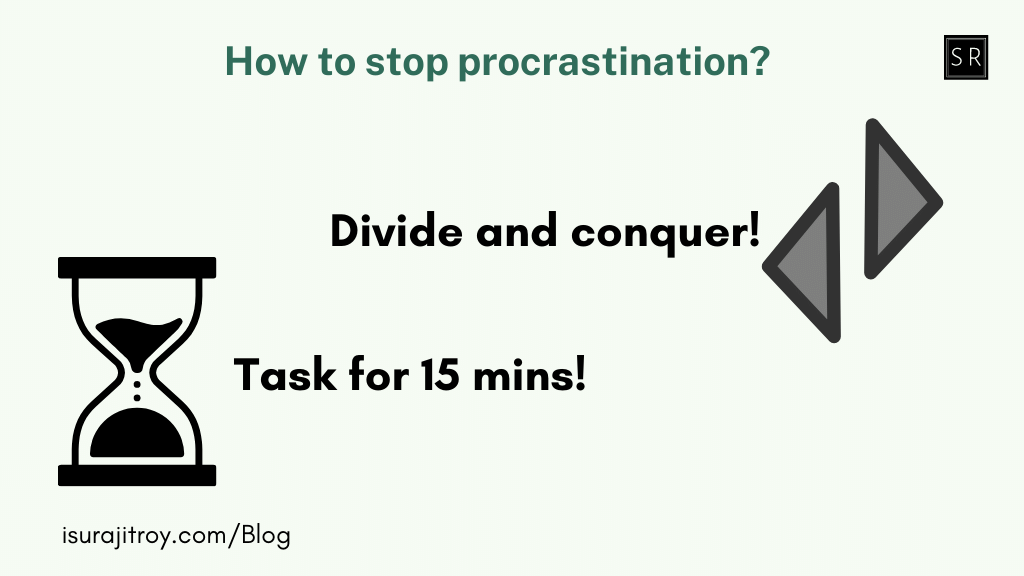
Divide and conquer!
Divide and conquer is a great way to stop procrastination. By breaking down a large task into smaller, more manageable pieces, it is much easier to focus on and complete. This way, it is easier to create a timeline and a schedule for completion of the task, which will help to eliminate distractions and keep the task on track. Breaking a task into smaller parts also allows for more efficient use of time, as each part can be completed faster and with greater accuracy. By taking a more organized approach to completing tasks, procrastination can be easily overcome.
Do the hard stuff first!
Doing the hard stuff first is a great way to stop procrastination. It helps you focus on what is important and gets the most difficult tasks done and out of the way. It also allows you to finish the day with a sense of accomplishment, knowing you have conquered the hardest part and can now work on the easier tasks. Additionally, if you have a looming deadline, getting the hard stuff done first will help you complete the project faster and with less stress. Finally, it helps build your confidence as you progress through complex tasks, allowing you to take on more difficult challenges.
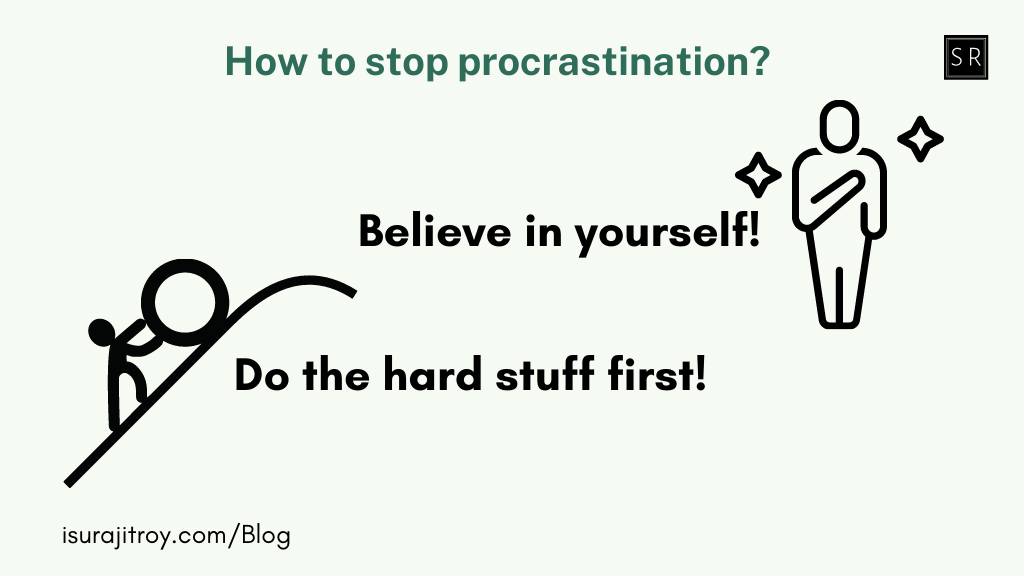
Believe in yourself!
Believing in yourself is one of the most important steps to take to stop procrastination. When you believe in yourself and your ability to accomplish things, you will be more likely to put in the necessary effort to get things done. You will be more motivated and confident to take on tasks and be productive. When you have faith in yourself, it will be easier to focus on the task and work towards achieving your goals. Believing in yourself will help you to stay focused and organized, and will give you the determination and strength to stay on track and get things done.
Done is better than perfect!
Done is better than perfect when it comes to procrastination. It’s easy to get caught up in the perfect outcome and this can lead to procrastination. If you focus on just getting something done, you will be more productive and motivated. You will also be able to move onto the next task more quickly. Instead of getting stuck in the perfectionist mindset, focus on the progress you have made and the positive outcomes you have achieved in the process. Done is better than perfect, so don’t be afraid to take a risk and just get it done.
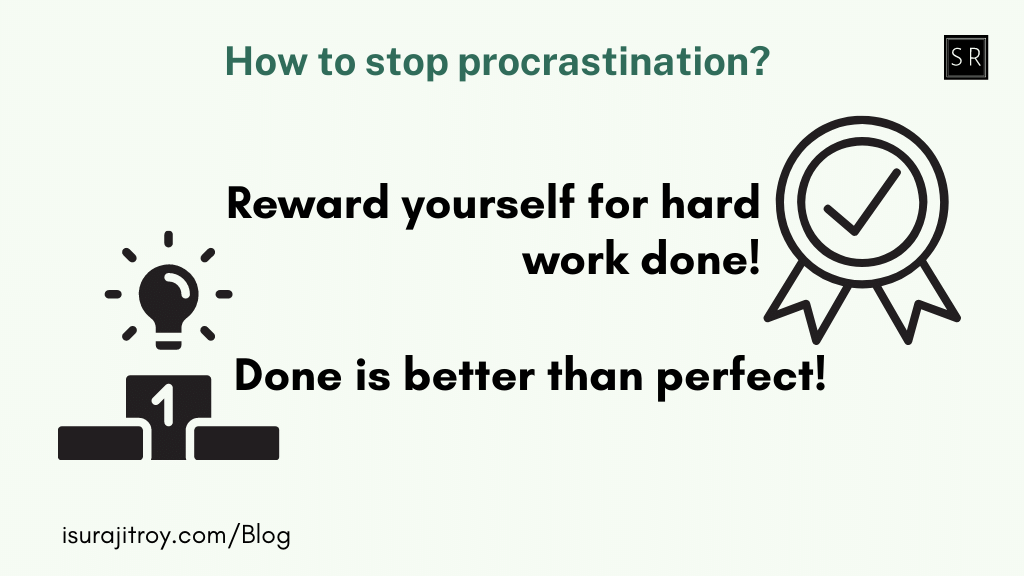
Reward yourself for hard work done!
Reward yourself for a job well done when you overcome procrastination. Whether it’s a pat on the back, a small treat, or a day off, reward yourself for your hard work and dedication. Acknowledge the effort you have put in and the progress you have made. Celebrate your success, no matter how small, as it will give you the motivation to keep going. Rewarding yourself for a job well done will also help you to build a positive relationship with yourself, which will help you to stay motivated and continue working hard.
Be kind to yourself, forgive and move on!
Be kind to yourself and forgive yourself for procrastinating. Moving on is the only way to stop procrastination. Make sure to keep yourself motivated and set realistic, achievable goals that you can work towards. Find strategies that can help you manage your time and complete tasks on time. Schedule regular breaks to keep your mind fresh and your motivation high. Take time to reflect and appreciate the progress you have made and celebrate the small successes. A positive attitude will help you keep your focus on the task at hand and move forward.
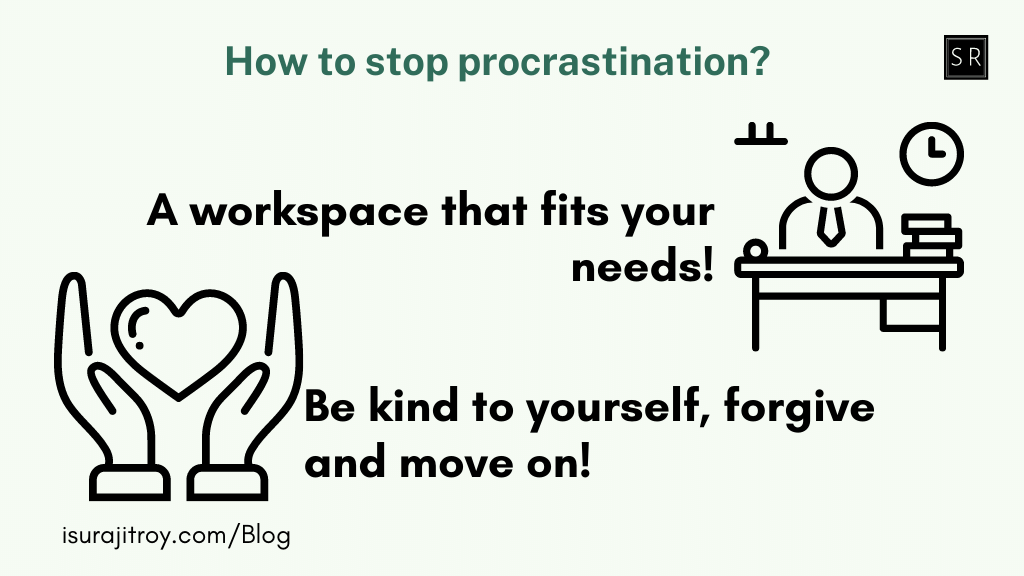
A workspace that fits your needs!
A workspace that fits your needs is an important factor to stop procrastination. It should be comfortable, organized, and free of distractions. A desk and chair, good lighting, and all of the necessary materials should be in the workspace. It should be comfortable, with the right temperature and humidity levels, so that you don’t get distracted by any discomfort. It should also be organized, with everything having a place and your desk free of clutter. Finally, it should be free of distractions, such as noise, cell phones, and other electronics, so that you can focus on your work. A workspace that fits your needs is an essential part of avoiding procrastination.
Install apps to reduce phone use!
Installing apps to reduce phone use is an effective way to stop procrastination. By setting limits on the time spent on the phone, you can focus on more important tasks and minimize distractions. Apps like Moment and Offtime allow you to set restrictions on apps and notifications, preventing you from getting sucked into mindless scrolling. Time-tracking apps like RescueTime can help you to understand how you are spending your time and identify patterns of procrastination. With the help of these apps, you can reduce phone use and take back control of your time.
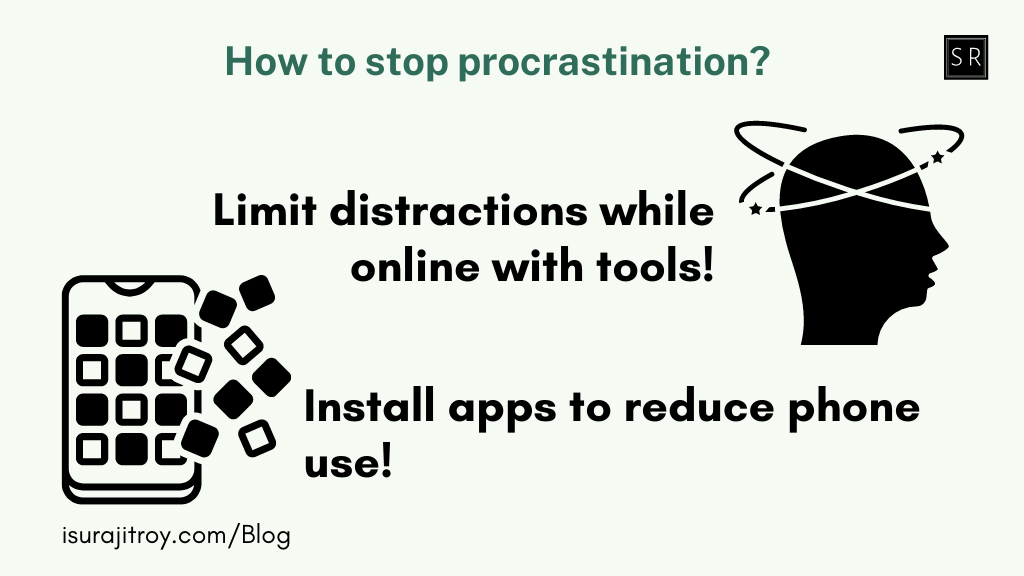
Limit distractions while online with tools!
Limiting distractions while online can be a challenge, but there are tools that can help. Apps like Freedom and StayFocusd are designed to block websites and apps that are known to be distracting. Chrome extensions like StayOnTask and TimeWarp also allow users to set limits on how long they can spend on certain websites and will even track their usage. Additionally, tools like “Rescue Time” and “Self Control” allow users to limit their internet usage in general, as well as block specific websites. These tools are great for anyone who needs help staying focused online.
Take your phone away if needed!
If you have a child who is constantly on their phone, it may be necessary to take it away if they are not using it appropriately. Taking a phone away can be a difficult decision, however it can be an effective way to teach your child to use their phone responsibly. It also gives them a break from the constant distraction of the device and allows them to focus on other activities. It’s important to ensure the phone is used in a healthy way and that your child understands why you have taken it away. Establishing clear rules and expectations around phone use can help to avoid the need for it to be taken away in the future.
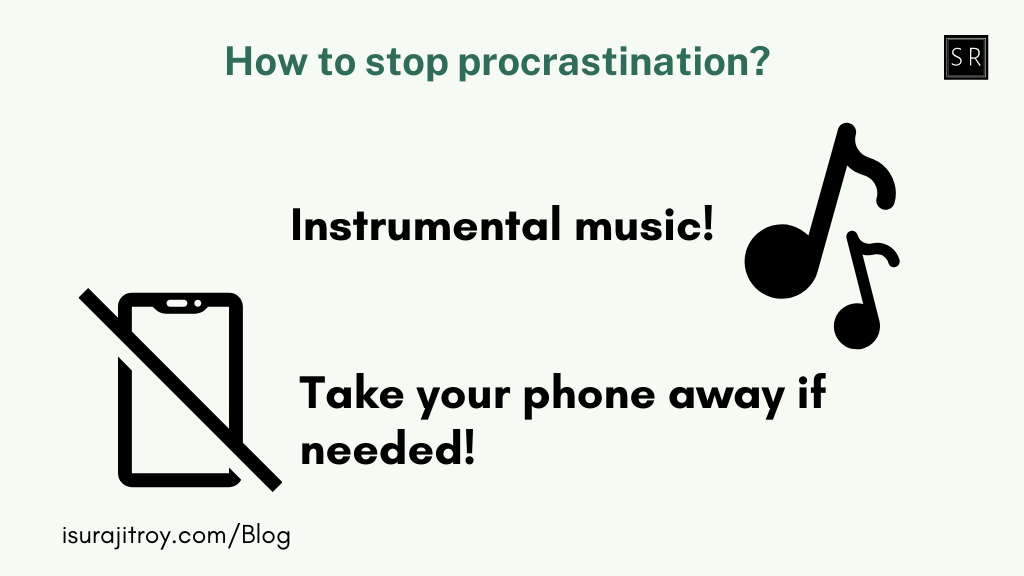
Instrumental music!
Instrumental music without lyrics can be a great way to stop procrastination. Listening to instrumental music can help you to focus on the task at hand and clear your mind of any distracting thoughts. It can also provide a calming and soothing atmosphere that can help reduce stress. Some popular genres of instrumental music that can be used to help with procrastination include classical, jazz, ambient, and instrumental covers of popular songs. Listening to instrumental music can also help to improve your mood and motivate you to get the job done.
Organize tasks, set deadlines, and achieve goals!
Organizing tasks, setting deadlines, and achieving goals are all powerful tools to help stop procrastination. When tasks are organized into manageable chunks, it becomes easier to stay on track and accomplish them. Setting deadlines helps to create a sense of urgency and make procrastination less attractive. Goals are important motivators to help keep you continually striving for better results. Achieving goals can be rewarding and can help to keep you motivated to stay focused and organized. With the right combination of organization, deadlines, and goals, procrastination can be defeated.
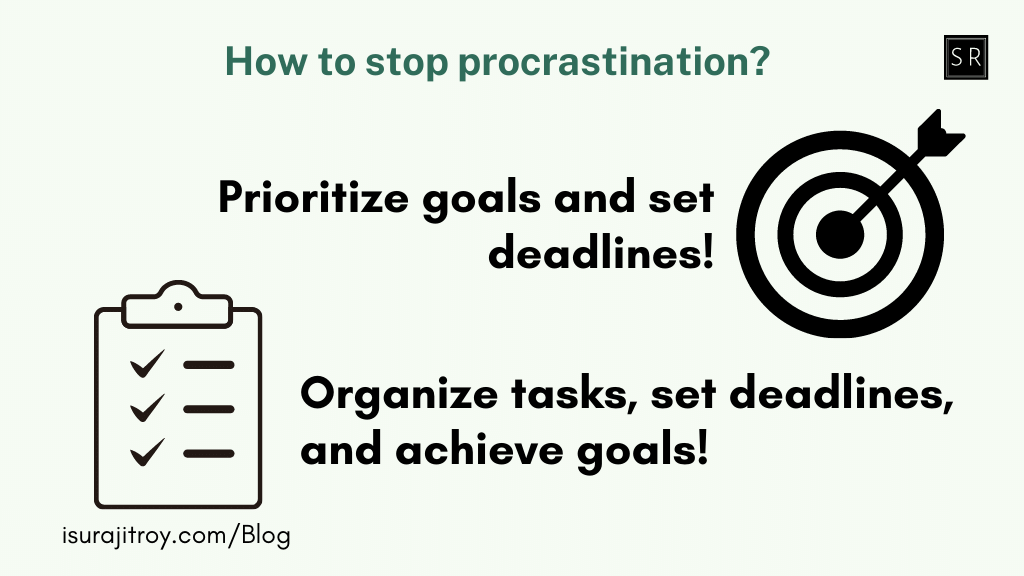
Prioritize goals and set deadlines!
Prioritizing goals and setting deadlines are two effective ways to stop procrastination. To prioritize goals, it is important to determine what is most important and break down tasks into smaller, achievable goals. Setting deadlines helps to provide a sense of urgency and provides a timeline to work towards. It also helps to break down tasks into smaller, more manageable chunks and to avoid overwhelming yourself. This way, it is easier to stay focused and motivated to complete the task.
Focus on one goal at a time!
Focusing on one goal at a time is the key to stop procrastination. It is important to break down each goal into smaller, more manageable pieces which can be accomplished within a certain time period. This will help to keep the motivation levels high as well as provide a sense of accomplishment. Moreover, it is important to have a plan of action and stick to it, as it will help to keep the momentum going and make progress towards the goal. Additionally, it is important to reward yourself for completing each goal, as this will keep the motivation levels high and help to keep procrastination away.
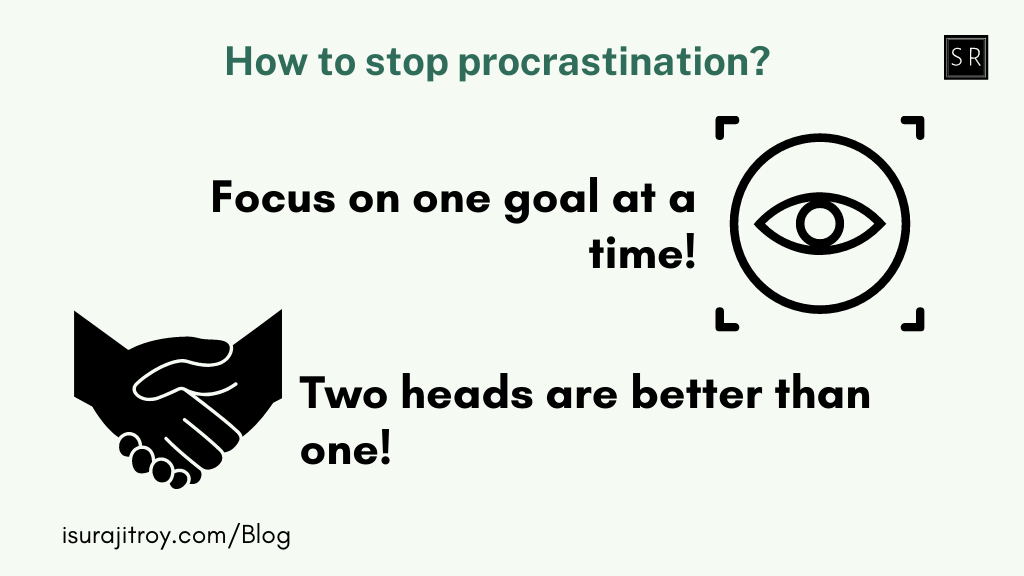
Two heads are better than one!
Two heads are better than one to stop procrastination. Working together to develop strategies to overcome procrastination can be very helpful. Having someone to act as a support system and provide encouragement can make a huge difference. Additionally, a partner can help to keep you accountable and motivated to stay on task. Communicating openly and honestly about the struggles of procrastination can help to build understanding, support, and connection. Ultimately, having someone to work with to tackle procrastination can provide the strength and extra push needed to stay focused and make progress.
The bottom line.
In conclusion, it is clear that academic procrastination is a widespread phenomenon that has been observed in both Western and non-Western cultures. The underlying causes of procrastination vary depending on the cultural context and are largely shaped by the values and norms of the culture. It is therefore important to understand the cultural and social dynamics at play when considering the issue of academic procrastination, in order to better address the issue and support students to succeed in their studies.
Love this Article?





